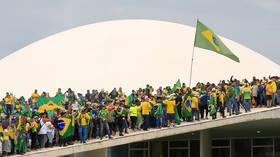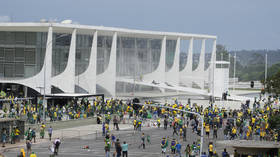Riots in Brazil: What we know so far
Angry crowds who still back ex-president Bolsonaro stormed three power branches in Brasilia as police need hours to restore order
Thousands of supporters of Brazil’s rightist former president Jair Bolsonaro stormed government buildings in the country’s capital Brasilia on Sunday. Several hundred people were arrested and dozens wounded amid clashes between the rioters and security forces.
What happened?
Thousands of Bolsonaro’s supporters, who refuse to accept his defeat –in a close election–to left-wing rival Luiz Inacio Lula da Silva, gathered in the capital Brasilia on Sunday.
The protesters, many of whom carried national flags and were dressed in the jerseys of the country’s national football team, moved towards the Congress, the Supreme Court and the presidential Planalto Palace. They swiftly overwhelmed the police cordons, climbing on the roofs of government buildings, smashing windows and causing havoc inside. Some in the crowd reportedly called for the military to intervene and restore Bolsonaro to power.
It took security forces several hours to restore order in the center of the capital, with some 300 rioters being arrested amid violent clashes. At least 46 people were wounded, including six left in serious condition, local media have reported, based on the data from the hospitals.
How did the authorities respond?
President Lula, who was inaugurated just a week ago, declared a state of emergency in the Federal District of Brasilia and called for a “federal intervention” to quell in the unrest. He slammed the demonstrators as “fascist fanatics,” insisting that they and those who masterminded the riots should be punished for what they’ve done. According to Lula, it was “genocidist” Bolsonaro who was to blame, for having encouraged his supporters.
The country’s Justice Minister Flavio Dino described the events in the capital as an attempted “coup” and promised more arrests in connection with the unrest.
Brazil’s Supreme Court suspended the governor of Brasilia Ibaneis Rocha for 90 days over failing to prevent the violence, despite the plans of Bolsonaro’s supporters to hold a major gathering having been well-known and widely reported in the media.
Justice Alexandre de Moraes argued that riots of such a scale “could only occur with the approval and even effective participation of the competent authorities.”
Ibaneis had earlier apologized for the events in Brasilia, branding the protesters “real vandals” and “terrorists,” and claiming that the city’s administration simply hadn’t expected the protests to reach such a scale.
What did Bolsonaro say?
Bolsonaro, who had earlier left Brazil for Miami, Florida instead of going to inauguration of his rival, has turned down Lula’s accusations of having instigated the riots, which, according to him, weren’t backed by any evidence.
“Peaceful demonstrations… are part of democracy. However, depredations and invasions of public buildings as occurred today… escape the rule,” he wrote on Twitter. The ex-president also pointed out that left-wing protesters in Brazil were responsible for similar actions in 2013 and 2017.
Bolsonaro never publicly conceded defeat and claimed without providing evidence that Brazil’s electronic voting system was vulnerable to tampering.
How did the world react?
US President Joe Biden told reporters that the Brazilian riots were “outrageous,” while Democratic members of Congress Alexandria Ocasio-Cortez and Joaquin Castro went even further and called for Bolsonaro’s extradition from the US.
Other leaders in the region have also condemned the events in Brasilia, with Venezuelan President Nicolas Maduro blaming the violence on “Bolsonaro’s neo-fascist groups.” Mexican President Andres Manuel Lopez Obrador said that there was an “anti-democratic coup attempt” orchestrated by the “leaders of oligarchic power” in the country.
The president of Brazil’s neighbor Argentina, Alberto Fernandez, declared that his nation stood “together with the Brazilian people to defend democracy and never again allow the return of the coup ghosts promoted by the right.”
The Russian Foreign Ministry described as “unacceptable” the attempts to violate constitutional order by the “radical-minded representatives of the Brazilian opposition.” It was vital to maintain internal political stability in Brazil, which is “our strategic partner,” the ministry pointed out.
Comparisons to US Capitol riot
The riots in the Brazilian capital drew parallels with the January 6, 2021 storming of the US Capitol by supporters of then-President Donald Trump. Bolsonaro, who is sometimes referred to as ‘Trump Of South America,’ also doubted the reliability of the electronic voting system and questioned the outcome of the election despite it being recognized by various politicians in the country, including some of his own allies, as well as by dozens of foreign governments. One of the differences between the events in Washington and Brasilia was that in the latter case the unrest took place on the weekend and the government buildings were mostly empty.
Trump has repeatedly denied encouraging violence on the day of the protest. While the demonstrators successfully pushed their way into the Capitol, in some cases allegedly with the help of local police, they accomplished little beyond vandalism to the building. A number of rioters lost their lives amid the chaos, including one woman fatally shot by police and multiple others who suffered medical episodes, while nearly 1,000 individuals later faced a harsh crackdown from local and federal law enforcement agencies.







Comments are closed.